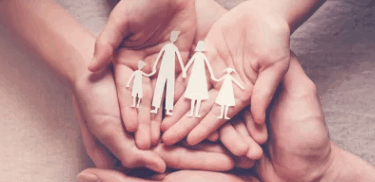By age 8, 48 percent of African-American girls and 15 percent of Caucasian girls are showing clear signs of puberty, according to Diana Zuckerman, Ph.D., president of the National Research Center for Women and Families.
Today, a girl of 7 or 8 who is starting to develop breasts or pubic hair is considered “on the early end of normal,” says Paul Kaplowitz, M.D., Ph.D., a professor of pediatrics. Kaplowitz is also the author of Early Puberty in Girls (Ballantine), a book that goes a long way toward easing parents’ anxiety.
Perhaps even more important than when puberty starts is how fast it progresses. Sometimes a 6-year-old girl can have the very beginnings of breast development, but it doesn’t progress beyond that stage for several years, Kaplowitz explains. That scenario causes less concern than that of an 8-year-old girl who is rapidly progressing through puberty.
What Causes Early Puberty?
Often, a girl follows the genetic pattern of her mother. If mom went through puberty early, her daughter likely will, too. But that has been the case for generations. What is causing so many girls today to begin developing breast and pubic hair at younger ages?
Obesity has an important connection to early puberty in girls, according to a 2001 study published in the American Academy of Pediatrics medical journal, Pediatrics. The study of 17,000 girls found that 6- to 9-year-old girls who had started developing breasts or pubic hair were significantly more overweight than girls of the same age who had not. It also found that this association was stronger for Caucasian girls than for African-American girls.
The percentage of children ages 6 to 11 who are overweight has nearly doubled since the late 1970s, according to a 2001 U.S. government report. Some 20 to 25 percent of kids are either overweigh or close to being overweight, the report states.
Scientists are on the hunt for additional possible causes, and are looking at everything from certain plastics and industrial chemical compounds called phthalates found in cosmetics to hormones found in meat and milk. While no large, comprehensive studies have been done to determine the true effects of such factors on early puberty, “there is clear evidence that pesticides and some other exposures interfere with hormones and can cause reproductive abnormalities in animals,” says Zuckerman, who is concerned that prenatal exposure to pesticides, hormones and phthalates may be a contributing factor in early puberty.
Periods Not Arriving Earlier
Given that many girls develop breast tissue and pubic hair at earlier ages these days, it’s logical for parents to assume that girls’ periods are starting earlier, too. But according to Zuckerman, the average age of first menstruation is similar to what it was a generation ago: 12.1 years old for African-Americans and 12.8 for Caucasians.
Even if a girl’s period does start on the early side, Kaplowitz says most girls are able to handle having a period (including the hygiene-related tasks) by age 10. At age 9 or younger, it is important for the doctor and parents to assess a girl’s readiness to handle menstruation, both emotionally and from a practical standpoint, he adds.
It helps for parents to be given a timetable, Kaplowitz says, noting that after the onset of breast development, the first period will generally arrive within two to three years. This knowledge allows parents to talk with their daughter about her changing body and to prepare her for the start of menstruation.
Social Impact
“Girls and guys are very aware of who has hit puberty and who hasn’t, and no one feels comfortable being way ahead or way behind the pack,” says Carol Weston, author of Girltalk: All the Stuff Your Sister Never Told You (HarperCollins).
“Girls become self-conscious about leg hair, breast size and whether they’ve started their periods,” she says. “It’s best when a parent can say, in a comfortable, matter-of-fact way, ‘Everyone grows up, but at different rates. Puberty has nothing to do with emotional maturity, so don’t let this affect your friendships.'”
It helps to let kids know that, in no time, everyone in their grade will be back in sync and no one will care who got her period or underarm hair first or last.
How Parents Can Help
Talk with your daughter about her developing body and the changes she can expect. Depending on your daughter’s age and maturity level, you may also want to discuss sexuality, relationships and pregnancy. Parents can check with pediatricians, school principals, PTAs or other local resources for information on classes catering to the puberty-age crowd.
Try to keep the “birds-and-bees” conversations low-key, experts suggest. “It helps if a mother is able to go shopping with her daughter and casually say, ‘Hey, want to try on some bras?’ since many girls are too embarrassed to articulate the question and are dying for Mom to bring it up,” Weston says.
It also helps if parents tell their daughters that if they get their period in school, all they have to do is raise their hand and say that they need to go to the nurse. “Better yet,” says Weston, “give your daughter some pads to leave in the back of her locker.” To an adult this may sound simplistic, she says, but to a young girl, it provides welcome peace of mind.
Warning Signs
When are the signs of early puberty normal – and when do they indicate the need for a visit to an endocrinologist? If you notice rapid changes over a four- to six-month period or if you see that your child is crossing over into higher percentiles on her growth chart, as opposed to tracking along the same percentile, talk with your child’s doctor, Kaplowitz suggests. The doctor may suggest an evaluation by an endocrinologist. Zuckerman notes that parents “should always take their child to an endocrinologist if the child’s development is very early or very late compared to most peers.”
Offering Calm Support
Parents set the tone for how daughters will handle the potential physical, emotional and social challenges of early puberty. By remaining calm and matter-of-fact, your daughter will see that puberty – even if it’s arriving early – is just another part of life.
Weston says, “Parents should just keep trying to help their daughters recognize and enjoy their strengths so they feel good about who they are and don’t just define themselves by how developed they are or what they look like.”
Sounds like good advice.
Kathy Sena is a freelance health writer and columnist.





